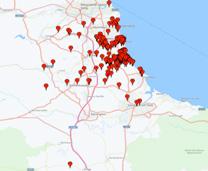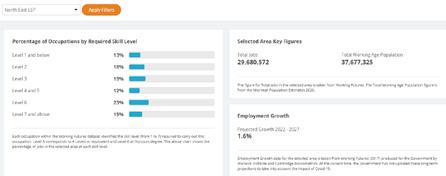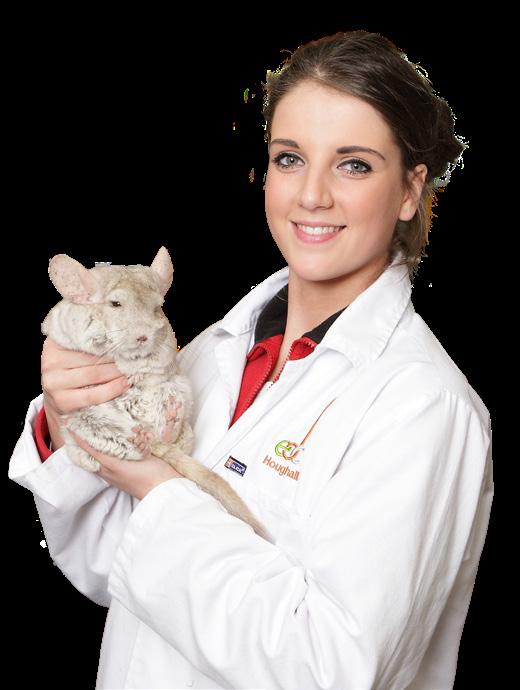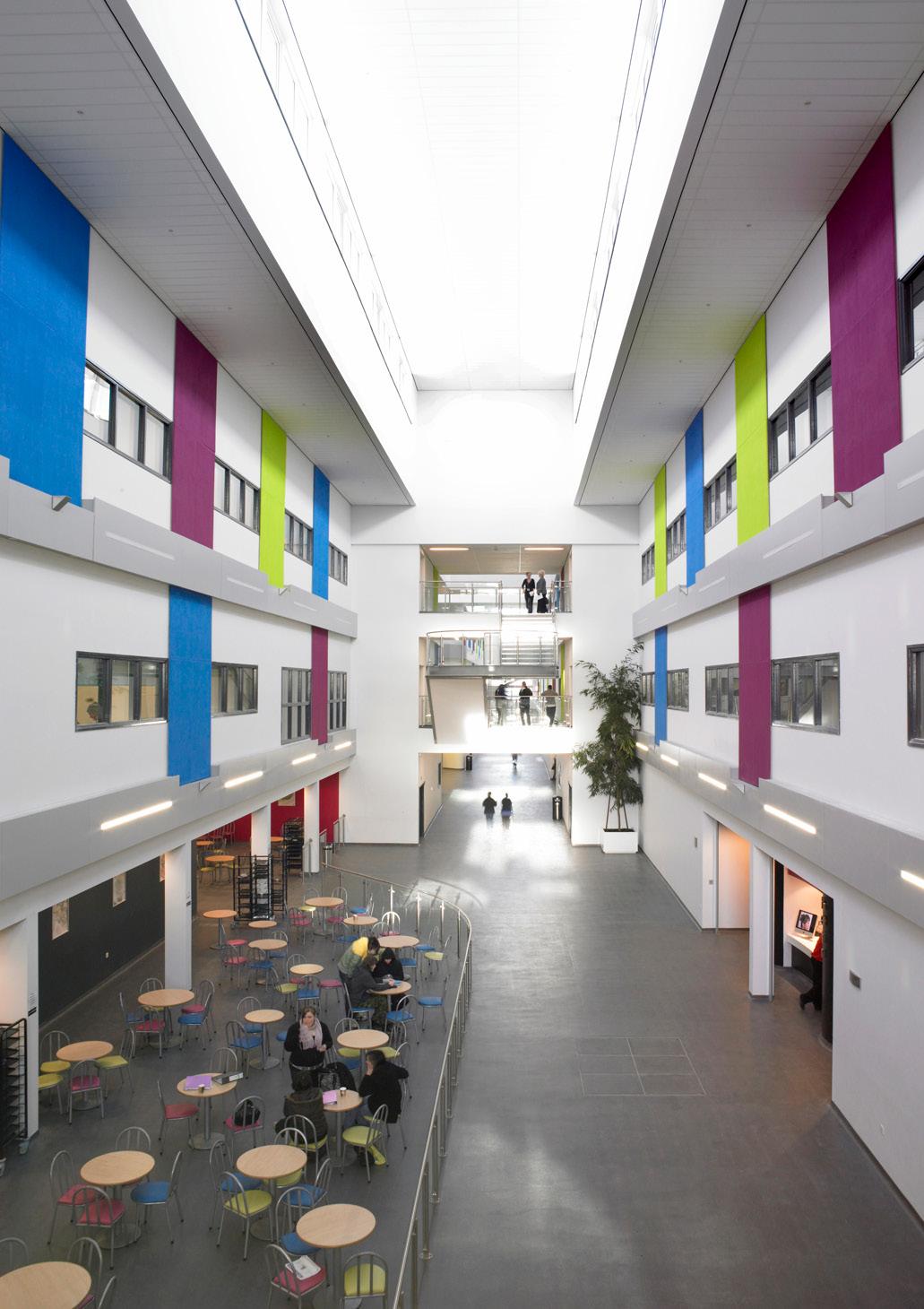









Students are at the heart of our decision making as we strive to achieve a highly ambitious curriculum for all.
Nurture a culture of respect for all; providing an inclusive environment which promotes a sense of belonging and community amongst students and staff.

Our vision is to provide exceptional further and higher education, providing opportunities for all, through purposeful and collaborative partnerships.
We will specifically grow provision in regionally important skills priority areas including construction, advanced manufacturing, social care, digital, culture, creative and tourism and health and life sciences, horticulture, agriculture and food security and sustainability.
Quality is at the heart of our curriculum and service delivery enabling our organisation to thrive.
To build a sustainable provision for our current and future communities.
Our vision is underpinned by these core values

Corporate social responsibility (CSR) is a term used to describe the ethical and charitable actions of organisations. This is a term more widely used in the private sector, as organisations like the College that are publicly funded or in the charitable or third sector exist to meet societal need. The College exists to serve its student population and wider community and this statement outlines how this is achieved.
As a further education college and a significant local employer, we have a major role to play in the social and economic welfare of the east Durham and the wider region, and an ethical responsibility to our planet.
As well as providing learning and progression opportunities for a wide range of abilities and across the broadest subject areas, as part of the College experience, students are encouraged to make a significant contribution in terms of their own social responsibility. In addition to providing statutory learning around the British Values of democracy, tolerance and the rule of law, all full-time students are supported to deliver a positive contribution to the local area of their choice through social action projects. These projects involve thousands of students per year and numerous local charities, community groups and support networks benefit.
This work has been recognised nationally when the College won the Association of College’s Beacon Award in 2021. The college is committed to working positively to expand, develop and evaluate our approach to improving the sustainability of our operations, as well as to deliver sustainability as part of our educational offer. The College has developed a sustainability strategy, in partnership with the Students’ Union, and students also sit as members of the Sustainability Committee.
The College makes available its facilities and resources for the wider community benefit. This allows local, grass roots sports teams to access the College’s training facilities, local GP surgeries to refer patients for fitness programmes, local drama and dance groups to make use of the College theatre for large scale performances, and hair and beauty students regularly provide treatments for those who work in or are supported by charities. Students and staff of the College also undertake a number of projects with the Town Council to progress shared goals around the promotion of development of Peterlee as a town.

We will make our vision a reality by being solutions focused, creative and responsive to our local community need. We will deliver the following strategic priorities:-
Strategic Objective 1
We are ambitious for our PERFORMANCE and we will continue to grow our share of key markets whilst achieving excellence in provision that meets regional skills needs.
We will:
Deliver growth in key priority skill areas through active collaboration with employers across different types of provision utilising grant and alternative funding streams including:
Construction
Advanced Manufacturing & Engineering
Health, Life and Animal Sciences
Social Care
Digital
Horticulture
Agriculture
Food Security and Sustainability
Creative, Cultural, Tourism and Hospitality
Grow our higher level academic and technical progression pathways in skills priority areas
Continue to grow our 16-18 market share
Strengthen our position as the biggest and most successful provider of land-based provision in the region
Grow our offer for those aged 14-16 in both size and geographical reach

Continue to grow our apprenticeship offer in volume and breadth
Have confidence and courage in our offer and strengthen our reputation by being bold in the messages we give
Strategic Objective 2
Achieve STRONG FINANCIAL HEALTH whilst growing our income and maintaining exceptional quality and high levels of student satisfaction. We will:
Ensure we provide precise and timely management information to allow pro-active and accurate decisions to be made by the management team and which supports a healthy culture of accountability
An estate that is fit for purpose and enhances teaching, learning and assessment across all sites and for all students with 90% in condition A and B
Implement financial plans that allow for continued investment in our estates, teaching and learning facilities and resources so that they represent the best of industry standards
Maintain financial health by growing margins as well as focussing on income
Teaching all students, through our staff, about sustainability to create a more sustainable environment for all
Consistently deliver a highly ambitious curriculum for all evidenced through external quality assurance
Strategic Objective 3
We are ambitious for our PEOPLE, and we will develop and implement an aspirational People Strategy which will support our people to work collaboratively to deliver our highly ambitious curriculum goals. This includes:
An active student body who develop key employability attributes through social action projects that also lead to a wider community impact
All students benefit from a highly ambitious curriculum, delivered by teaching staff who are subject experts with relevant and credible industry experience, skills and qualifications
Transformative team development plans which result in collaborative and solution focussed working practices that inform outstanding teaching, learning and service delivery
All business support teams actively achieve high standards that support a high quality learning experience through continuous personal and service development
Managers are highly skilled and can lead change that results in high quality efficient service delivery

Teaching and support staff with the capability and confidence to use technology to support curriculum and improve service delivery
Rapid and bespoke support for new and existing staff that meets the needs of an agile curriculum and broad student population.
Recruitment practices, including different models of employment, which result in high calibre and energetic staff who understand their role in achieving a highly ambitious curriculum

Promotion of wellbeing for staff with clear career pathways and succession planning

Strategic Objective 4
We are ambitious for our PARTNERSHIPS and we will participate in highly effective and proactive collaborations which allow us to accelerate our growth in key priority skills areas. This includes:
Active engagement and collaboration with the right partners to further our plans across all strategic aims
All students positively progress to relevant destinations as a result of an employer led curriculum created in partnership by proactive staff Implementation of the CRM system which is used effectively across college and allows us to have meaningful and impactful conversations with stakeholders
Business Development Teams that are knowledgeable and market the whole college offer allowing us to meet funding and income targets dentification and utilisation of alternative funding streams to fund capital developments, meet skills gaps and other needs
Strategic Objective 5
Build a COLLABORATIVE NETWORK that increases our impact and reach. We will: Produce a new Stakeholder Engagement
Strategy which is fully integrated into our systems and processes and clearly states how we will listen and respond to a wide range of stakeholders
Ensure clear and transparent channels for stakeholders to engage with the college so that they get a positive experience every time
The College will continue to play an active part in its community; enriching lives, promoting community cohesion and tackling inequalities
Flex our delivery models to ensure adult provision is delivered where and when it has the most impact and widens participation
Regular review of attendance at external meetings to ensure the right person is at the right meeting
Made up of three campuses (including a 500-acre land-based site) medium sized general FE College, that enrols around 4000 students and employs 500 staff
The third largest provider for 16–18 year-olds in County Durham
Consistently the biggest provider for adults in the County Durham (around 50% of our enrolment volume is for this age group)
The biggest FE provider for 14–16-yearold provision in the North East Local Enterprise Partnership (NELEP) area
The biggest land-based provider in the NELEP area
The largest provider for education for students with Education Health Care Plans (EHCPs), including specialist autism provision
The fifth largest provider of apprenticeships in the County with income doubling over the past three years
Inclusive; we offer provision in all 15 subject sector areas, across all levels, including a significant and broad A level offer and recruit from across the northeast as shown, by campus, on the maps below
The vast majority, 93%, of the College’s enrolments are at levels 1-3.
Over a third of 16 to 18-year-olds study at level 3 (A level and equivalent) with others starting their studies at lower levels before following progression pathways up to level 3. Around three quarters of students who study at levels 1 and 2 progress to the next level, and 50% of level 3 students progress to HE, with 90% achieving their first choice university.
Percentage of Starts by Level (2021/22)
73% of students aged 16-18 at the College come from County Durham with the second largest cohort (12%) from Sunderland. The College has an excellent relationship with local schools. The College has the fastest growth in 16 –18-year-olds in the County, and recruitment of this age group is above the increase seen locally and nationally, and particularly strong at level 3. Overall recruitment is 11.8% up on the previous year, compared to a national change of 4.4%. County-wide growth of school leavers from 2019/20 to 2020/21 years was 4.7%.
Almost three quarters of adult recruitment is at level 2.
East Durham College is a significant provider of apprentices at levels 2, 3 and 4 to local businesses across a range of occupational areas, including leadership and management, engineering and landbased occupations.



East Durham College has excellent buildings at the Willerby Grove campus and has invested a significant amount in its land-based estate since 2015/16. A four-stage campus re-development is underway at Houghall, of which two stages are complete. A grant of £10m from NELEP to support phase 1 was received, with the remainder raised by the College to complete the scheme. The investment in land-based provision is allowing for successful growth in students studying a range of land-based subjects, as well as in higher-level provision, with plans to do more. Building on the success of the popular BSc (Hons) in Animal Science and Welfare, now into its third year, plans are in place to meet other higher-level geographical gaps in provision over the next few years working with our HE partner. The vision for land-based skills training is to support the development of a more productive, high tech and environmentally sensitive rural economy, through our involvement with the North East Centre for Crop & Soil Innovation, with partners Durham University and Newcastle University.
East Durham College is part of the North East Institute of Technology (NEIoT). The College provides enhanced training in construction and advanced manufacturing alongside our programmes to develop the higher-level technical skills employers need. Investment by the NELEP and the Department for Education has provided industry-standard training facilities and expert training in electric and hybrid vehicles, mechatronics, pneumatics and robotics, as well as the digital skills required for precise food production within agriculture. Other key partners in the NEIoT include Esh, Nissan, New College Durham (lead college), Sunderland College, Tyne Coast, NA College, Middlesbrough College and Newcastle University. edc.ac.uk
* Data for an NVQ Level has been removed due to low numbers, please refer to the table below.
The College defines its highly ambitious curriculum as one that contains the elements below and this is the expectation in all areas for all students:
Highly effective implementation of the right combination of qualifications (ambitious, meets employer skills needs and student progression aspirations) that lead to outstanding teaching, learning and assessment.
Right student, right course, right level approach to recruitment, facilitated by robust CEIAG throughout the course.
Progression pathways through the levels (up to level 5).
Meaningful work experience.
Meaningful and inclusive skills competitions.
High quality resources in world class facilities.
The development of industry standard and specific digital skills.
High expectations of staff and students that meet the best of industry standards.
Real Work Environments used well which benefit staff and students.
Employer involvement including curriculum design and employer led / set briefs and projects.
Staff with relevant, credible, and up-to-date skills and experience.
High quality and highly effective support to ensure all students achieve their potential.
Reviews of higher education provision carried out by the College’s main HE partner, the University of Sunderland, confirm that provision continues to be of high quality. East Durham College was selected as one of 20 national Centres of Excellence by WorldSkills UK in 2020. Other awards include an Association of Colleges Beacon Award for social inclusion and community engagement (February 2021), and individual staff members have won prestigious awards for teaching – Alison Scattergood won the national TES Teacher of the Year 2018 and Rebecca Hough won RHS Chelsea Flower Show Gold Medallist also in 2018. In 2020, and 2021, Catherine Taylor won the national Peter Jones Enterprise Academy (PJEA) Teacher of the Year.
The success of our staff in regional and national competitions is matched by that of our students. Declan Wild won the PJEA Student of the Year 2022 following in the footsteps of many previous successful PJEA students, such as Katie Rowan who was a PJEA National Entrepreneur of the Year Finalist and Tycoon Enterprise Competition Winner 21/22 with her Perfect Pony Products business start-up.
Our hairdressing, beauty and barbering students have a long tradition of successfully competing in local, regional and national competitions.
The most recent national wins were at the Association of Hairdressers & Therapists (AHT) competition in Blackpool in May 2022, where Leah Davison, Sophie McDevitt and Suzanne Flint all claimed the top spot in their categories. In addition, the hairdressing department won the Lee Stafford Education College of the Year Award 2022.

Our level 3 floristry students won gold at the Harrogate Flower Show 2022! The brief was to create a display based on a famous piece of artwork and their remarkable winning entry was inspired by Steven Brown’s iconic Rab & Isa McCoo paintings.
Students from many areas of the College take part in the annual round of North East Inter-College Competitions, with our dance students being the most recent winners.
The Willerby Grove Campus in Peterlee offers a range of vocational study programmes, A-levels, higher education programmes and provision for directly recruited 14–16-yearolds. The Technical Academy, based on Peterlee’s Southwest Industrial estate, offers a range of engineering, construction-related vocational pathways including renewables and an HE offer in engineering.
Grove Enrolments Willerby
Technical Academy Enrolments
Willerby
Technical Academy Enrolments
East Durham College has consistently achieved an overall rating of Good from Ofsted inspections across a range of frameworks since 2008.
The last full inspection was in September 2021, and the overall rating of Good, with outstanding for behaviour and attitudes awarded.
The Houghall Campus, in Durham, offers a range of land-based study programmes, in eight different career pathways, a higher education offer and several industry related commercial courses. SEN provision is delivered across Willerby Grove and Houghall with the latter also hosting a provision for students with autism.

County Durham is a largely rural county and suffers from a poor transport infrastructure in many areas. Within the county there are pockets of severe, sustained deprivation with 69.2% of the population living in the 30% most deprived areas with significant volumes in the 0.2-10% most deprived areas in England. Employment rates are lower than the national average, qualification attainment lags national attainment rates, and the average salary is lower than the regional and national average. A high proportion of students come from the most deprived areas in the county (73%) with a third of these coming from the most deprived areas in England, and a high proportion claim free school meals, over 13% points above the national average.

Continual improvement in student outcomes, raising participation and attendance and strengthening inclusion pathways for the hardest to reach, vulnerable students will always remain the highest priority for the College. We maintain a broad offer, across all subject sector areas,
East Durham College makes a considerable contribution to its community. All 16–18-year-olds students take part in a community action project where they investigate issues in their local area and give their time and effort to helping alleviate social issues, promote good causes or develop wellbeing strategies. This work forms part of our social corporate responsibility and was recognised nationally in 2021 when the College was awarded Beacon Status by the Association of Colleges.
The ‘local’ area that the College serves is defined by several political geographies; the Northeast LEP area (the whole of the northeast from the borders of Scotland to the Tees Valley), the College itself is based in County Durham, which has just signed a devolution deal to become part of NECA (the North East Combined Authority, which will cover the NE region, minus the Tees Valley and the North of Tyne area) and a smaller geography is the focus for the Local Skills Improvement Plan (LSIP) which covers County Durham, Gateshead, South Tyneside
the NELEP skills priorities:
Advanced Manufacturing Construction
Digital
Health and Life Sciences
Transport and Logistics
Land-based skills are not a stated priority for either the NELSIP or the NELEP but this is a significant part of the College’s offer. Data from Vector* shows that there are 4000 jobs in agriculture and the land-based sector in the NELEP area and this sector has the greatest proportion of working owners compared to all other sectors.
The largest employment sector for the region is health and health/life sciences, including social care, which accounts for 17% of all jobs in the NELEP* area, above the national average. Other sectors where employment in the region is more than 1.5% above the sector average include public administration, manufacturing, education and accommodations services and food.
The visitor economy (accommodation and
food) is not identified as a NELSIP nor NELEP priority, but is identified as such by the North of Tyne Combined Authority. (* 2021 data)
The profile of businesses in the NELEP area shows that they are dominated by those defined as micro (0-9 employees) and small (10-49 employees) who make up 81% and 16% respectively, with just 3% of business defined as medium (50-249 employees) and large (250+ employees). In County Durham, 98% of businesses are micro or small, and 2% are medium or large.
Data taken from Vector below shows the percentage of occupations by required skill level and the projected economic growth in the next 5 years. Half of jobs require skills at levels 1-3.

This plan has been produced at a time of unprecedented change in the FE sector, and wider society.
In the short to medium term our students, staff and the system in which the College operates are facing the following challenges:-
Students - cost of living crisis/ mental health concerns
Staff - workforce / recruitment & retention & pay issues
Colleges – rising energy costs / fixed funding levels leading to sector sustainability fears
Curriculum – significant qualifications
reform /T Level implementation / lifelong learning entitlement
Systems – Office for National Statistics
reclassification of the sector / Local Skills Improvement Plans / funding & accountability reforms
The sector is widely recognised as underfunded, yet the delivery of an effective skills system is central to the Government’s economic strategy. The Skills for Jobs White Paper, published in January 2021 sets out ambitions to reform the skills system by including measures to:
give employers a greater say in the development of skills provide higher level technical skills provide a flexible, lifetime skills guarantee simplify and reform funding and accountability for providers support outstanding teaching
The Government’s Build Back Better Plan for Growth published in March 2021 places FE colleges firmly at the centre of the levelling up agenda, leading a skills led recovery out of the Covid pandemic and supporting employers to increase their productivity.
The report highlights the following technology and sectors are vital for the UK’s future:-
Life sciences

Digital & creative industries
Clean/green energy
Fintech (computer technology to support and enable banking and financial services)
Defence & security
The vast majority of students remain in the north east region, so the dominant employment sectors in NELEP region are paramount in determining the focus of the curriculum. The sectors representing 5% or more of total employment in the region are health, manufacturing, retail, business administration and support services, accommodation and food services, education, public administration and defence.
For the future, the NELEP Strategic Economic Plan identifies four headline areas of strategic importance for economic growth – Digital, Advanced Manufacturing, Health and Life Sciences and Energy – and four enabling services; Education, Financial/Professional/ Business services, Transport and Logistics, and Construction. Digital transformation is recognised as a key driver for the four enabling services. In addition, the NELEP has just published a health, life sciences and medicines manufacturing growth strategy, reflecting the importance of the health and life sciences sector to the region’s economy, and how this sector will be supported to grow in the future.
48% of the College’s enrolment is in key priority sectors as defined by the NELEP and the Build Back Better national plan.
The College revises its offer annually, using robust labour market intelligence to inform its offer. The positive benefits to students were confirmed at the last Ofsted visit in 2021.
The recently published FE White Paper highlights the need for growth in higher level technical qualifications to fill recognised skills gaps, and collaboration with others as a means of achieving the aspirations set out in the paper. Set within the framework of a national skills strategy, collaborative regional partnerships will have the flexibility required to deliver a jointly coordinated set of outcomes that maximise the impact on individuals and industry. The paper also sets out an ambition to provide flexibility in student finance to support modular, and flexible delivery methods for higher level technical skills, so that funding for these courses by individuals is as easy to access as for full degrees.
The College began the delivery of T-level courses in September 2022 in the areas of Digital (digital production, design and development, digital business services), Construction (design surveying and planning, building services engineering) Education and Childcare, Healthcare Science and Engineering (maintenance, installation and repair, manufacturing and process) and has plans to deliver more.
East Durham College has established and leads a regional health and health science skills hub which provides for forum for a strategic relationship/dialogue with the health sector so that FE colleges further support and deliver provision to fills skills gaps. The hub was successful in securing £2.7m to support partners (Bishop Auckland College, New College Durham, Learning Curve Group, the University of Sunderland, Sunderland College, Gateshead College, Tyne Coast College and Derwentside College) to improve apprenticeship provision at levels 2 and 4 in healthcare science and levels 2 and 3 in science manufacturing, as well as developing careers materials and a suite of flexible learning modules for existing healthcare professionals.
The local landscape is dominated by micro and small businesses; 98% of business in County Durham have less than 50 employees, and this percentage is 97% for the NELEP area.
The College works with a number of key local employers with the aim of:Improving the quality and productivity of local businesses through training and skills development of their workforce; Engaging in joint research projects with industry, particularly at our land-based Houghall Campus;
Securing work experience, industrial placement and supported internships for our students.



In addition to apprenticeships, training in leadership and management, and a range of workplace learning and sector specific courses to equip or renew employees’ licence to practice qualifications, we also offer a staff recruitment service; pre-vetting applicants to provide primed-and-ready candidates for employers to interview.
We also offer venues for meetings, (large or small), presentations, product launches, conferences, and formal meals, as well as a video production service.
 Scan to read the Research Trials at Houghall
Scan to read the Research Trials at Houghall
Area Why?
Construction
This is a national, regional and local skills priority. The interest in modern methods of construction (MMC), specifically offsite modular building, has been growing since the pandemic. The Governments ‘Build, Build, Build’ and ‘Green Industrial Revolution’ pledges has ensured that the wider industry has been forced to think differently. The proportion of new homes built using MMC is predicted to increase from 6-10% currently to 20% by 2027. Key job areas include Construction Production Managers and Directors and Specialist Construction Professionals, both of which have predicted growth of 4.8%. The college will continue its training in the key trades which input into MMC such as joinery, however it will look to increase the wider knowledge and skills of LEAN and production quality process management such as six sigma.
Agriculture and Horticulture
Advanced Manufacturing and Engineering
Life Sciences (inc Health and Social Care)
LMI indicates a 7% increase in the numbers of jobs which require practical farming skills. Additionally, the average age of a UK farmer is 59. New entrants to farming and food production need a new skills set and understanding of the link between science and technology and agriculture for the UK to meet the target in the Government Food Strategy. Horticulture is a cross cutting theme which goes across all land based areas delivered at Houghall.
This is a national, regional and local skills priority. Almost three quarters (70%) of UK Manufacturing businesses report that trade has returned or even exceeded pre-pandemic production. An annual growth rate of 4.56% is expected between 2023 and 2027. Key job areas include Production Managers in Manufacturing (4.8% growth); Engineering Professionals including mechatronics (3.3%); Quality Control and Planning Engineering (3.3%); Design and Development Engineers including robotics and CAD (3.3%) and Electronic Engineers (3.3%).
In 2021 it was reported that there wouldbe 107,598 jobs (which is 22% above the national average) available within the health Industry alone in the North East. This figure is set to rise by over 1.9% in the next five years. Following on from this the 2021 Skills Gap report discovered that 84% of respondents in the healthcare sector were suffering from a lack of skilled workers. Within Life Sciences which is a sub-component of Health, there is an expected 7% growth in the job market by 2028. Life sciences is broken down into three distinct areas: Pathology, Genetics and Reproductive Science. The top four healthcare jobs in demand are Nurse Practitioners (52% increase from 2020-2030); Physical Therapists (35%); Medical and Health Service Managers (32%) and Medical Assistants.
Animal Science
Qualification reform is a risk to maintaining learner numbers. T-levels will only meet part of the local skills needs and are unlikely to support progression to the STEM HE pathways which meet regional LMI data which indicates a 21% increase in veterinary activities (vets, veterinary nurses). Spending on pet care in the UK saw a 270% increase from 2005 - 2021 with more growth expected.
Digital 82% of advertised jobs required digital skills at some level, with those requiring higher level skills paying a significantly higher salary. This is a national, regional and local skills priority and is central to most roles as well as being a job in its own right. Many industries are also relying on automation to help with economic recovery following covid. Key job areas are data science and analytics (9.2% growth), cyber security (12%) as well as the infrastructure and connectivity to support business activity and remove digital poverty and exclusion.
Culture, Creative and Tourism
Regional tourism related jobs are set to grow in the north east by over 20% in the next 10 years, the majority of these are set to be in the travel sector. This presents both a national and regional skills priority which we can position our learners to take advantage of. Following the restrictions imposed by Covid, the travel sector is now working hard to recover to pre-pandemic levels. To achieve this growth these organisations are looking to change to more modern ways of working and are therefore looking for a more modern skills set. This presents a great opportunity for us to place our learners competitively as this sector grows. East Durham is uniquely placed between all of the norths major travel hubs which means that learners are geographically well placed to take advantage of the industry growth.
While the College operates in an environment where ambitions are high, but funding is low, there will be an annual review of provision so that scarce resources are deployed to better meet our community’s needs.
We will always look to maintain the breadth and depth of our offer, especially in light of 50% of jobs requiring skills at levels 1 – 3, and will focus our investment in developing the skills priority areas on the left up to level five.




